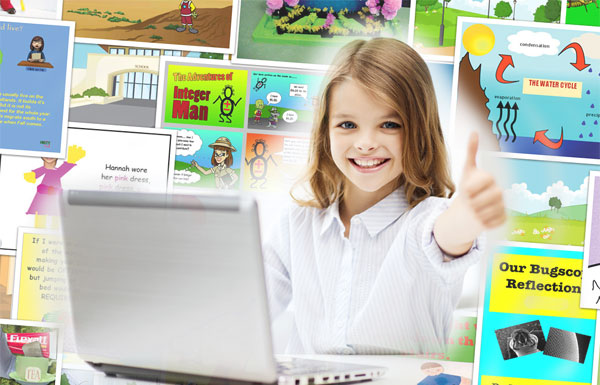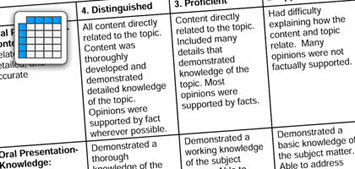
Students will create a daily newspaper edition to show what they have learned about the politics and culture of an ancient civilization.

While few students read a newspaper nowadays, they are familiar with TV news and online news services. Use this familiarity with the media format by asking them to become staff members for an ancient newspaper!
Transform your class into a publishing team that writes and designs articles on topics such as politics, arts and culture, sports and entertainment, and the economy.
Complete your unit on ancient Rome, or another civilization, or use this as a means to engage students with the content and focus on a particular time, like the monarchy or the Republic.
This lesson could easily be adapted to help students learn about the time period of a book they are reading. For example, if students are reading F. Scott Fitzgerald’s The Great Gatsby, have them create an online magazine for the 20s.
Explore the structural features of informational materials. Bring in examples of printed newspapers and magazines and then look at their online counterparts to see how the delivery medium affects the content.
As a class, brainstorm what makes an effective newspaper. Catchy headlines? Bright ads? Compelling articles?
To promote media literacy skills and help students become more savvy media consumers, ask them to brainstorm how to can attract readers and get them interested in your newspaper. How can you effectively inform them about the news, events, and other ideas in your newspaper?

As a group, determine the creative direction for the newspaper and decide what type of articles, features, and ads you would like to include. Develop a loose structure and then complete a storyboard that includes information about the articles that need to be written.
Have each student contribute at least one article to the newspaper. Provide direction and share your expectations for the length and content of their articles. Be sure to share suggestions for research and note taking and have them partner with another student to edit and revise their rough draft before submitting the final article.
Students can also create political cartoons or comics. Since these require high-level synthesis of cultural information and subtleties, this would certainly be appropriate for a separate project and worthy of an additional grade or credit.
While the major structural components were decided earlier, the look, feel, and navigation for the newspaper still need to be designed so that the entire project can have continuity. Have the class explore existing online newspapers to see how they are divided and portrayed. Have students revisit the storyboard and complete it with design elements and additional nontextual media.
To complete the design, you could assign roles of Editor-in-Chief, photographer, copy editor, and typesetter. These students would be responsible for maintaining vision, finding appropriate supporting images and videos, editing articles, and laying it all out in a tool like Wixie.
When the newspaper is complete, you can print out individual pages. If the paper is built in Wixie, use the Project Wizard feature to collect all the student work into one project and post on the school web site. This will transform the old-style newspaper into an online news site.
Have students read all of the articles in the paper, since they may have worked on a smaller part of the project. To help them further review the information, have small teams create dramatizations and present the story as a live newscast in your classroom
If you require the articles to be written before the newspaper can be designed, you can assess the writing and content of the articles even before the newspaper is complete. You may choose to assign multiple grades or credits for the project, including points for writing a clear and effective article, overall newspaper design, time management, and teamwork.
Students should share their work in a folder (both on the computer and in a tangible one in the room) so that you can also assess their progress toward a complete newspaper on deadline! You may want to look at time management strategies as well as help students develop a project calendar.
Adkins, Lesley, and Adkins, Roy. Handbook to Life in Ancient Rome ISBN: 0195123328
DK Publishing. Ancient Rome (DK Eyewitness Series) ISBN: 0756606519
The Roman Empire in the First Century
Time, Continuity, and Change
Social Studies programs should include experiences that provide for the study of the ways human beings view themselves in and over time, so that learners can:
c) identify and describe selected historical periods and patterns of change within and across cultures.
Writing Standards
Production and Distribution of Writing
4. Produce clear and coherent writing in which the development, organization, and style are appropriate to task, purpose, and audience.
Research to Build and Present Knowledge
7. Conduct short as well as more sustained research projects based on focused questions, demonstrating understanding of the subject under investigation.
Language Theme Language Standards
Conventions of Standard English
1. Demonstrate command of the conventions of standard English grammar and usage when writing or speaking.
Knowledge of Language
3. Apply knowledge of language to understand how language functions in different contexts, to make effective choices for meaning or style, and to comprehend more fully when reading or listening.
3. Knowledge Constructor
Students critically curate a variety of resources using digital tools to construct knowledge, produce creative artifacts and make meaningful learning experiences for themselves and others. Students:
a. plan and employ effective research strategies to locate information and other resources for their intellectual or creative pursuits.
b. evaluate the accuracy, perspective, credibility and relevance of information, media, data or other resources.
c. curate information from digital resources using a variety of tools and methods to create collections of artifacts that demonstrate meaningful connections or conclusions.
6. Creative Communicator
Students communicate clearly and express themselves creatively for a variety of purposes using the platforms, tools, styles, formats and digital media appropriate to their goals. Students:
a. choose the appropriate platforms and tools for meeting the desired objectives of their creation or communication.
b. create original works or responsibly repurpose or remix digital resources into new creations.
d. publish or present content that customizes the message and medium for their intended audiences.

Follow us on Instagram for daily inspiration

Create a thought web, cluster, flowchart, or other graphic organizer for a lesson
8 first projects to get students using technology
Creative, digital book reviews
Fun and powerful ideas with animated characters

Wixie
Share your ideas, imagination, and understanding through writing, art, voice, and video.

Rubric Maker
Create custom rubrics for your classroom.

Pics4Learning
A curated, copyright-friendly image library that is safe and free for education.

Wriddle
Write, record, and illustrate a sentence.

Get creative classroom ideas delivered straight to your inbox once a month.
Topics